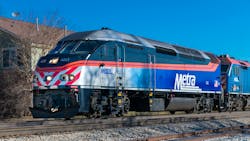Metra’s proposed 2026 operating budget includes fare increase, no service reduction
Metra’s proposed $1.1 billion 2026 operating budget includes cost-saving efforts to cover a projected $68 million shortfall. While no service will be cut, there will be a Regional Transportation Authority (RTA)-mandated fare increase. Metra also proposed a $575.3 million capital plan for bridges, stations and new and rehabilitated rolling stock. The board will vote to approve the plans in November.
Metra had previously anticipated a much larger funding gap starting in 2026 due to pandemic relief funds running out, as well as reduced fare revenue resulting from decreased ridership. However, the agency says it anticipates getting through most of 2026 prior to the relief funds being fully spent. Metra says it also anticipates covering the smaller budget gap with prioritized hiring, higher sales taxes, and delayed discretionary spending and service expansions.
The agency is still estimating much larger budget gaps in the coming years, with a $276.3 million anticipated shortfall in 2027 and a $304.8 million expected shortfall in 2028. These shortfalls would require significant cuts to service, along with other measures, if no additional state funding is secured.
To help address the budget gaps, RTA instructed Metra, Chicago Transit Authority and Pace Suburban Bus to increase fares by at least 10% for next year, a first since 2018. Metra is planning to increase fares between 13% and 15% since the agency must round to the nearest quarter for onboard fare collection. The increase will depend on the type of fare product and the distance traveled.
Examples of increased fares for one-way tickets include:
- Zone 1-2: Increase to $4.25 from $3.75
- Zone 1-3: Increase to $6.25 from $5.50
- Zone 1-4: Increase to $7.75 from $6.75
A full breakdown of fare increases based on fare type is available on Metra’s website.
The 2026 proposed operating budget is 1.7% lower, or $18 million less, compared to 2025, which Metra says mostly reflects operating efficiencies and other reductions offset by anticipated inflationary, contractual and market increases.
Funds to support the budget come from $325 million in system-generated revenue, including $207.8 million from fares. Another $635.9 million comes from regional sales tax. The remaining $206.1 million is funded with federal relief money. The agency proposes to set aside $60 million from fare revenue to support capital needs, including replacing or repairing hundreds of old bridges.
The $575.3 capital program is funded by $426.7 million in federal formula funding and discretionary grants, $88.6 million in Illinois PAYGO funding, $100,000 in an RTA Access to Transit grant and $60 million in Metra capital funding.
Capital program allocations include:
- $268.2 million for rolling stock
- $68.4 million for bridges, tracks and structures
- $59.1 million for signals, electrical and communications
- $27.3 million for facilities and equipment
- $59.9 million for stations and parking
- $92.3 million in support activities
